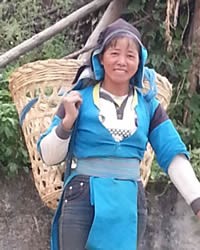Kua-nsi in China

Photo Source:
Anonymous
|
Send Joshua Project a map of this people group.
|
| People Name: | Kua-nsi |
| Country: | China |
| 10/40 Window: | Yes |
| Population: | 5,400 |
| World Population: | 5,400 |
| Primary Language: | Kua-nsi |
| Primary Religion: | Ethnic Religions |
| Christian Adherents: | 3.00 % |
| Evangelicals: | 1.00 % |
| Scripture: | Translation Needed |
| Ministry Resources: | No |
| Jesus Film: | No |
| Audio Recordings: | No |
| People Cluster: | Tibeto-Burman, other |
| Affinity Bloc: | Tibetan-Himalayan Peoples |
| Progress Level: |
|
Introduction / History
The Kua-nsi people, a small ethnic group in China, reside in the southwestern region of Yunnan Province. Their origins are closely tied to the larger Tibeto-Burman language family, though the Kua-nsi have developed a distinct identity through centuries of isolation in the mountainous terrain. Despite the pressures of modernization and integration into broader Chinese society, the Kua-nsi have preserved their language and traditional ways. Their history is marked by resilience in maintaining their customs and lifestyle in the face of changing political and social landscapes.
What Are Their Lives Like?
The Kua-nsi people lead agrarian lives, primarily relying on subsistence farming to meet their needs. They grow rice, maize and vegetables in the terraced fields that line the steep slopes of their mountainous homeland. Community cooperation is vital for survival, as families work together in the fields and share responsibilities in daily tasks. In addition to agriculture, the Kua-nsi raise livestock such as pigs and chickens, which provide food and supplemental income. Their villages are small and tightly knit, with traditional homes constructed from locally sourced materials like wood and stone.
What Are Their Beliefs?
The Kua-nsi practice a blend of traditional animism and ancestor worship, although some have also incorporated elements of Buddhism. They believe that spirits inhabit the natural world, particularly in the forests, rivers and mountains that surround them. Rituals are performed to honor these spirits and seek their protection, especially during key events like planting and harvesting. Ancestral veneration plays an important role in their spiritual life, with ceremonies that connect the living with past generations. While Buddhist influence exists, traditional beliefs remain at the core of Kua-nsi religious practices.
What Are Their Needs?
The Kua-nsi people face numerous challenges related to their remote location and limited access to basic services. Healthcare, education and infrastructure are scarce, leaving them marginalized in many aspects of modern Chinese life. Their isolation also makes it difficult for them to access economic opportunities beyond subsistence farming. Development programs that focus on improving access to healthcare and education are essential for the well-being of the Kua-nsi. Additionally, there is a need for sustainable agricultural practices that can help them adapt to environmental changes without compromising their cultural heritage.
Prayer Points
Pray the hearts of the Kua-nsi people would be stirred to hunger after God, to drink his living water.
Pray for family-based movements to Christ to soon transform Kua-nsi society, blessing them spiritually and economically.
Pray for the Lord to move in the hearts of believers to give up their own rights and sacrifice their lives to see the Kua-nsi people blessed by the work of Jesus Christ, the only savior.